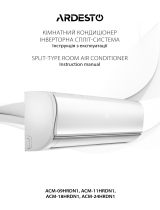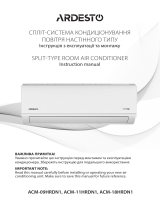
4
SAFETY INSTRUCTIONS
• Read these Operating Instructions carefully before using this air conditioner. If you still have any difficulties or problems,
consult your dealer for help.
• This air conditioner is designed to give you comfortable room conditions. Use this only for its intended purpose as described in
these Operating Instructions.
Confirm to authorized dealer or specialist on usage of
specified refrigerant type. Using of refrigerant other than
the specified type may cause product damage, burst and
injury etc.
Never touch the unit with wet hands.
Never use or store gasoline or other flammable vapor or
liquid near the air conditioner — it is very dangerous.
Do not use this appliance in a potentially explosive
atmosphere.
This air conditioner has no ventilator for intaking fresh air
from outdoors. You must open doors or windows frequently
when you use gas or oil heating appliances in the same
room, which consume a lot of oxygen from the air.
Otherwise there is a risk of suffocation in an extreme case.
Provide a power outlet to be used exclusively for each unit,
and a power supply disconnect, circuit breaker and earth
leakage breaker for overcurrent protection should be
provided in the exclusive line.
Provide a power outlet exclusively for each unit, and full
disconnection means having a contact separation in all
poles must be incorporated in the fixed wiring in
accordance with the wiring rules.
To prevent possible hazards from insulation failure,
the unit must be grounded.
Do not clean inside the indoor and outdoor units by users.
Engage authorized dealer or specialist for cleaning.
In case of malfunction of this appliance, do not repair by
yourself. Contact to the sales dealer or service dealer for a
repair.
Refrigerant gas leakage may cause fire.
For safety, be sure to turn the air conditioner off and
also to disconnect the power before cleaning or
servicing.
Pull off the power plug from a receptacle, or switch off the
breaker, or switch off the power disconnecting mean to
isolate the air conditioner from the main power supply in
case of emergency.
Do not insert your fingers or other objects into the air
conditioner indoor or outdoor unit, rotating parts may
cause injury.
Do not use modified cord, joint cord, extension
cord or unspecified cord to prevent overheating
and fire.
Stop using the product when any abnormality/failure occurs
and disconnect the power plug or turn off the power switch
and breaker.
(Risk of smoke/fire/electric shock)
Examples of abnormality/failure
• The ELCB trips frequently.
• Burning smell is observed.
• Abnormal noise or vibration of the unit is observed.
• Water leaks from the indoor unit.
• Power cord or plug becomes abnormally hot.
• Fan speed cannot be controlled.
• The unit stops running immediately even if it is switched
on for operation.
• The fan does not stop even if the operation is stopped.
Contact immediately your local dealer for maintenance/
repair.
This appliance is intended to be used by expert or trained
users in shops, in light industry and on farms, or for
commercial use by lay persons.
Do not turn the air conditioner on and off from the power
mains switch. Use the ON/OFF operation button.
Do not stick anything into the air outlet of the outdoor
unit. This is dangerous because the fan is rotating at
high speed.
Do not touch the air inlet or the sharp aluminum fins
of the outdoor unit. You may get injured.
Keep the fire alarm and the air outlet at least 1.5m away
from the unit.
This appliance is not intended for use by persons(including
children) with reduced physical, sensory or mental
capabilities, or lack of experience and knowledge, unless
they have been given supervision or instruction concerning
use of the appliance by a person responsible for their
safety. Children should be supervised to ensure that do not
play with the appliance.
Do not cool or heat the room too much if babies or invalids
are present.
Do not sit or step on the unit. You may fall down
accidentally.
Do not stick any object into the FAN CASE.
You may be injured and the unit may be
damaged.
01_F569003_EN.fm Page 4 Tuesday, February 12, 2013 2:53 PM






















